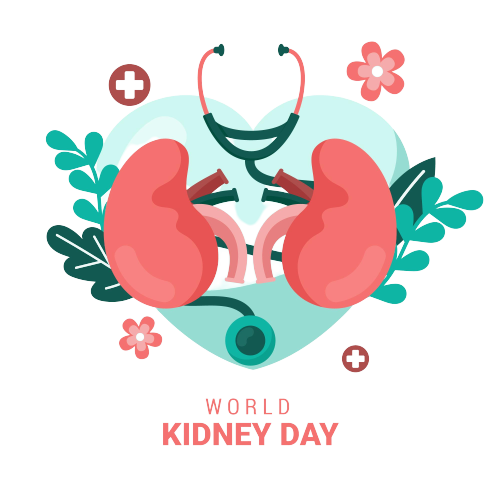

9 Ways to take care of your Kidneys
Kidneys are the bean-shaped organs situated at the lower part of your rib confine


9 Ways to take care of your Kidneys
Kidneys are the bean-shaped organs situated at the lower part of your rib confine, on the two sides of your spine. They perform several functions. In particular, they filter the excess water, different pollutants, and other impurities from our blood. These waste products are passed on to our bladder and later get expelled through urine.
Moreover, the function of kidneys is to regulate the pH, salt, and potassium levels present in our bodies. They likewise produce hormones that direct blood pressure and control the synthesis of platelets. Kidneys are majorly responsible for liable initiation of vitamin D that assists our body to absorb calcium for strengthening bones, thus ensures proper muscle functioning.
Maintaining kidney health is important to your overall health and general well-being. By keeping your kidneys healthy, your body will filter and expel waste properly and produce hormones to help your body function properly. Keeping a check on kidneys’ health is imperative to our overall health and fitness. Here are some tips to help keep your kidneys healthy.
Keep yourself active
For being physically active, you don’t have to run marathons. Everyday activities like walking, running, cycling, and even dancing are great for your health. Discover an activity you enjoy and can keep you occupied. It’ll be easier to stick to it and have great results.
Actively engaging in regular exercise lowers the potential risk of persistent kidney sickness. It can likewise reduce your blood pressure and elevate your heart wellbeing, which is critical for forestalling any damage to the kidneys.
Control your glucose
People with diabetes, or any condition related to high glucose levels, may contribute to kidney damage. In a situation where your body's cells can't utilize the glucose (sugar) constituents present in your blood, your kidneys are compelled to filter them. Causing extra pressure and stress than its regular functions.
Hence it's important to keep your sugar level in check. If you can successfully control your glucose level, you can even prevent damage that may be caused to your kidneys.
Blood Pressure
Hypertension or conditions like high blood pressure have a direct effect on the functioning of the kidney. In case a person has high blood pressure along with other medical issues like diabetes, heart problems, or high cholesterol levels, it causes negative repercussions to the kidney.
A healthy blood pressure reading is generally 120/80. Prehypertension is between that point and 139/89. In case your blood pressure readings are consistently above 140/90, you may be suffering from high blood pressure. Get on proper medications likewise.
Monitor weight and eat a healthy diet
People who are overweight or suffering from obesity are at greater risk for a number of health conditions that can damage the kidneys. These include diabetes, heart disease, and kidney disease.
Balanced Diet
It is a well-known fact that our diet has a direct effect on our physical and mental health. Focus on consuming a healthy and balanced diet that would be low in sodium processed meats. Include fresh ingredients that are naturally low-sodium, such as cauliflower, blueberries, fish, whole grains in your diet.
Drink a lot of liquids
Scientists have always given the platitude exhortation to drink eight glasses of water a day, however, it's a decent objective correctly in light of the fact that it urges you to remain hydrated. Standard, predictable water admission is solid for your kidneys.
Drinking water regularly and consistently helps to clear sodium content and other toxins from your kidneys. It additionally lowers the risk of chronic kidney diseases.
Don’t smoke
Smoking damages your body’s blood vessels. This leads to slower blood flow throughout your body and to your kidneys
Smoking likewise puts your kidneys at a higher risk. If you give up smoking, your kidney won't be at potential risk. However, it can't be as healthy as a non-smoker.
Be aware of the amount of OTC pills you take
If you are consistently under the medication of over-the-counter (OTC) pain prescription, you might be causing kidney harm. Nonsteroidal anti-inflammatory drugs (NSAIDs), including ibuprofen and naproxen, can cause damage to your kidneys in the event that you take them regularly for a long period.
People with no kidney issues who take the medicine occasionally are likely in the clear. Avoid taking such medicines every day or else you could be risking your kidney's health.
Have your kidney function tested if you’re at high risk
If you’re at high risk of kidney damage or kidney disease, that is if Kidney problems run in your genetics, then the primary step to avoid your kidney getting risk is proper medical tests. These tests must be done by the following individuals-
- people who are over 60 years old
- people who were born at a low birth weight
- people who have cardiovascular disease or have a family with it
- people who have or have a family history of high blood pressure
- people who are obese
- people who believe they may have kidney damage
When things get serious-
A little more than 1 in 10 people over the age of 20 show signs of kidney disease. Some forms of kidney disease are progressive, meaning the disease gets worse over time. When your kidneys can no longer remove waste from the blood, they fail.
Waste accumulated in your body can cause serious problems or even lead to death. The solution to this will be artificial filtration of your blood through dialysis, or you would need a kidney transplant.
Hence, before things get serious, consult l with your doctor about kidney-safe treatments if you’re coping with kidney-related pain.

Why is the Rate of Heart Attacks on Rise
For the last several decades, Heart attacks are becoming increasingly...
Read more
10 Tips for a healthy immune system
In addition to regularly observing the protocols recommended...
Read more